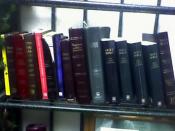Greek, Mesopotamian and Biblical Accounts of Creation
Perhaps many are well-acquainted with "the glory that was Greece." While Greece may have been quite glorious, when it comes to creation stories, they have to share their glory with many, many others. The Greeks were not the only ones with an explanation of how this world came into being, and what man's purpose is in the world: the creation myths of Hesiod and Homer are up against much competition. Among the most well-known creation stories, the one in the Bible probably comes to the mind of many, as well as the stories of ancient Mesopotamia, commonly known as Enuma Elish. While each story has its own peculiar differences, they all deal with the questions Hesiod addressed in his Theogony--namely, the origin of the earth, and the place that God or the gods have in ordering the affairs of mortals.
When compared to the Greek and Mesopotamian accounts, the Bible stands in stark contrast.
Although the Greek and Mesopotamian stories are definitely quite different from each other, their differences pale in comparison with their differences from the Bible. Yet it seems quite obvious that there is some common thread, a common base of creation myths, from which both the Greek and Mesopotamian myths are drawn, as well as some parallels between Biblical stories and their Greek and Mesopotamian counterparts.
The first common thread that is easily visible is the fact that in all three cases, Man is a relative latecomer. The rest of the world, and the gods or God, already existed before the human race came to be. In the Bible, Man is created on the sixth day of the creation week; in Mesopotamian myths, men are created to liberate the gods from their work in the canals (obviously, the gods,


